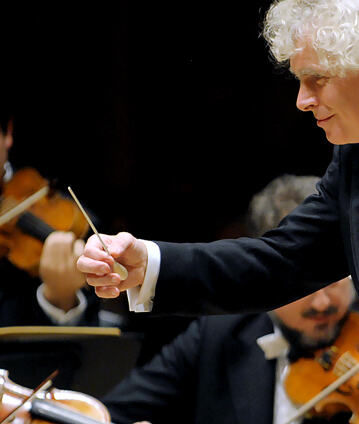Simon Rattle conducts Beethoven, Haydn and Widmann

Gloom and exuberance – these emotional extremes are to be found in both Haydn’s Symphony No. 95 – one of the few orchestral works by the composer in a minor key – and Beethoven’s Seventh Symphony with its famous Allegretto. Between these two classics, Simon Rattle and the Berliner Philharmoniker perform Jörg Widmann’s Flûte en suite, infused with Baroque charm, with Emmanuel Pahud as the soloist.
Joseph Haydn’s C minor symphony (No. 95), composed in 1791, is in many ways strikingly different from the other London Symphonies. It is the only one in a minor key, in addition to which Haydn dispensed with the slow introduction: right from the first tutti beat, the listeners are “in medias res”. What is also remarkable is the final rondo in which the lyrical tone is evidence of an engagement with Mozart’s late symphonies.
A revealing debate with tradition is also manifest in Jörg Widmann’s creative work. The composer says: “I don’t consider what is new a self-contained quality.” The performance of Widmann’s concerto Flûte en suite for flute and orchestral groups will feature Philharmonic principal flautist Emmanuel Pahud, who, after the work’s premiere in Cleveland in 2011, will be the first to perform the work in Europe. According to the composer, the work is “an arrangement of small sections like a suite, a collection of different dance forms. Almost each individual movement juxtaposes the solo flute with just one specific timbre, one instrumental group from the orchestra.”
After the interval the Berliner Philharmoniker and Sir Simon Rattle will dedicate themselves to Ludwig van Beethoven’s Seventh Symphony, a work that – with its hymn-like sounds and ecstatic rhythms – was celebrated as the “crown of the more recent instrumental music” by the Leipzig Allgemeine Musikalische Zeitung after its premiere in 1813. The stirring piece, which advanced to become an audience favourite within a very short time, the reviewer continued, is the “most tuneful, pleasing and comprehensive of all Beethoven symphonies”. More than a century later, Theodor W. Adorno even called it “the symphony par excellence”.
© 2012 Berlin Phil Media GmbH
Related interviews
Artists
Our recommendations
- Philharmonic chamber music: From the First Viennese School to Modernism
- Daniel Harding and Frank Peter Zimmermann
- Philharmonic chamber music: “Rêverie française”
- 2001 Europakonzert from Istanbul with Mariss Jansons and Emmanuel Pahud
- Paavo Järvi and Emmanuel Pahud
- The Berlin Phil Series: Vive la France!